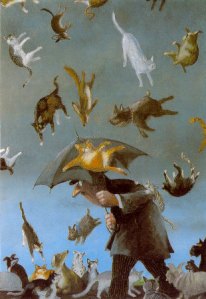Yesterday I posted on some atheists seemingly endless obsession with creationism and how they seemed to be falling into problems of scope as well as missing the point of the text. This uncovered, as with so many topics like this, a wealth of sub-topics that deserve attention.
The conversation that resulted from that post has been very good. Over at Atheism Debate, two of my new atheist friends offered fantastic insight and nuance to the discussion and others have provided some very useful feedback. This is one of the reasons I love talking about religion – it can only serve to sharpen what we truly believe!
One comment that came up in multiple discussions was the idea that because I am not reading the creation stories as a literal factual account of creation that I must be reading them allegorically. When I try to test myself with these terms, neither fits quite right. I believe the literal truth that the creation stories are teaching, and I believe that the story uses allegorical elements to convey some of those greater truths.
Literal, Allegorical, Literalistic, and Figurative
 Looking for more information on this, I found a nice quick distinction from someone who made a distinction between “literal” and “literalistic”. He used the following sentence as an example:
Looking for more information on this, I found a nice quick distinction from someone who made a distinction between “literal” and “literalistic”. He used the following sentence as an example:
“It’s raining cats and dogs outside.”
Literal meaning: its raining hard
Literalistic meaning: cats and dogs are falling from the sky!
I believe the creation stories are literal, not purely allegorical as some would cast them. I believe that mankind started with a man and a woman and that God created man and woman. I believe that we were created to walk with God in a paradise. And I believe that man violated this through original sin after speaking with the devil. I don’t believe that these beliefs are incompatible with the theory of evolution.
Furthermore, I believe the story of creation uses a lot of figurative language to tell this story. The story is somewhat allegorical, but it is not purely an allegory. And I believe this came from both creation stories origins.
The Genesis of Genesis
I’m not a biblical scholar, and I don’t intend to play one on the Internet. But the church has recognized that the creation stories told in Genesis are most probably written from popular narratives that existed at the time of its writing. We see similar creation stories in non-biblical sources to help collaborate this theory.
Whenever we read a source material it is essential to consider the audience. The creation stories and Genesis were not being written to be submitted for peer review. In reading Genesis the theme throughout the entire book is God’s relationship with man, man’s repeated betrayal of this relationship, and God’s promise to renew this relationship through ever deepening covenants. This theme is told through recounting the history of mankind, often telling these stories using figurative language.
My Simplistic Way of Understanding

One of my favorite movies growing up was Braveheart. The story of William Wallace and his love and struggle for freedom is a story that easily resonates. The story of William Wallace is true, but the move Braveheart is not entirely true.
The writers of Braveheart and Mel Gibson wanted to tell a story based on real events that exemplified the themes of man’s struggle against tyranny, a struggle for freedom. We give writers creative license to convey essential truths in a more esoteric manner.
And this is OK. It is not dishonest. Just because the movie doesn’t hold up as a historically accurate narrative of William Wallace’s life doesn’t mean that he didn’t exist, and it doesn’t negate the themes of freedom and liberty that run throughout the movie.
Quick Disclaimer: analogies are imperfect and limited by their very nature. This analogy obviously breaks down by virtue of the fact that as a Catholic I believe the Bible to be the word of God and flawless (Braveheart is not inspired). However, even though the analogy breaks down there, it does not negate the fact that each book of the bible was written by someone who was writing for their contemporaries in a unique voice and style. Ignoring this is simply narrow and simple-minded.
But How Can We Tell the Difference?
One of the complaints I often hear from atheists is the disagreement on scripture among Christians. Non-sola scriptura adherents talk about how one verse uses figurative language while another should be interpreted in a literalistic sense. How is anyone supposed to know the difference?
It is a valid complaint. There is a reason that we have had nearly 2,000 years of scriptural scholars. The scriptures are incredibly rich with symbolism that is borrowed and referenced between books that were written centuries apart. Dissecting this in light of the history of Judeo-Christianity is no small task.
The first is obvious: look at who the book is being written for. Song of Songs is poetic in its nature. Psalms are canticles. Acts of the Apostles is a historical narrative.
Secondly, realize that these are books that were written in different languages over the course of several centuries to various audiences with differing styles of being written. The bible isn’t a book – it is a collection of books. The study of these collections can consume a lifetime. Reading these books should be done with the goal of studying the texts.
This is one of the many reasons I love my Catholic faith. I don’t believe God would have given us the Bible and then say “have at it!”. The Catholic church teaches that the Bible is a written portion of the deposit of faith which goes along hand in hand with Tradition (notice the capitalization which is important). While the church does not interpret every verse of the Bible, it does hold that deposit of faith upon which individual interpretations can be tested.
I know it is not much of an answer for someone who is starting with the viewpoint that there is no God, and I don’t expect it to get much traction. It probably opens up far more discussion as well, but I’ve already let it known that I enjoy these discussions…
Update
Why try to rewrite what someone like Fr. Baron has already addressed. I would highly recommend watching this:
[…] tried to make this point in this post here, although my attempt was admittedly feeble and lacked depth. I added on a video from Fr. Baron who […]
The atheist obsession with creationists seems to be almost as bad as the Christian obsession with homosexuals.